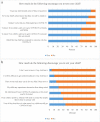Caregiver perceptions of in-home COVID-19 testing for children with medical complexity: a qualitative study
- PMID: 36076181
- PMCID: PMC9452877
- DOI: 10.1186/s12887-022-03550-5
Caregiver perceptions of in-home COVID-19 testing for children with medical complexity: a qualitative study
Abstract
Background: In-home direct antigen rapid testing (DART) plays a major role in COVID-19 mitigation and policy. However, perceptions of DART within high-risk, intellectually impaired child populations are unknown. This lack of research could negatively influence DART uptake and utility among those who stand to benefit most from DART. The purpose of this study was to describe caregivers' perceptions of an in-home COVID-19 DART regimen in children with medical complexity, including the benefits and limitations of DART use.
Methods: This qualitative study was a subproject of the NIH Rapid Acceleration of Diagnostics Underserved Populations research program at the University of Wisconsin. We combined survey data and the thematic analysis of semi-structured interview data to understand caregivers' perceptions of in-home COVID-19 testing and motivators to perform testing. Caregivers of children with medical complexity were recruited from the Pediatric Complex Care Program at the University of Wisconsin (PCCP). Data were collected between May and August 2021.
Results: Among n = 20 caregivers, 16/20 (80%) of their children had neurologic conditions and 12/20 (60%) used home oxygen. Survey data revealed that the largest caregiver motivators to test their child were to get early treatment if positive (18/20 [90%] of respondents agreed) and to let the child's school know if the child was safe to attend (17/20 [85%] agreed). Demotivators to testing included that the child could still get COVID-19 later (7/20 [35%] agreed), and the need for officials to reach out to close contacts (6/20 [30%] agreed). From interview data, four overarching themes described perceptions of in-home COVID-19 testing: Caregivers perceived DART on a spectrum of 1) benign to traumatic and 2) simple to complex. Caregivers varied in the 3) extent to which DART contributed to their peace of mind and 4) implications of test results for their child.
Conclusions: Although participants often described DART as easy to administer and contributing to peace of mind, they also faced critical challenges and limitations using DART. Future research should investigate how to minimize the complexity of DART within high-risk populations, while leveraging DART to facilitate safe school attendance for children with medical complexity and reduce caregiver burden.
Keywords: COVID-19; Children with medical complexity; Direct antigen rapid testing.
© 2022. The Author(s).
Conflict of interest statement
The authors declare that they have no competing interests.
Figures
References
-
- Pettypiece S. Biden administration to make 500 million at-home Covid tests available for free. 2021.
-
- Wanat M, Logan M, Hirst JA, Vicary C, Lee JJ, Perera R, Tracey I, Duff G, Tufano P, Fanshawe T, Mwandigha L. Perceptions on undertaking regular asymptomatic self-testing for COVID-19 using lateral flow tests: a qualitative study of university students and staff. BMJ open. 2021;11(9):e053850. - PMC - PubMed
Publication types
MeSH terms
Grants and funding
LinkOut - more resources
Full Text Sources
Medical


